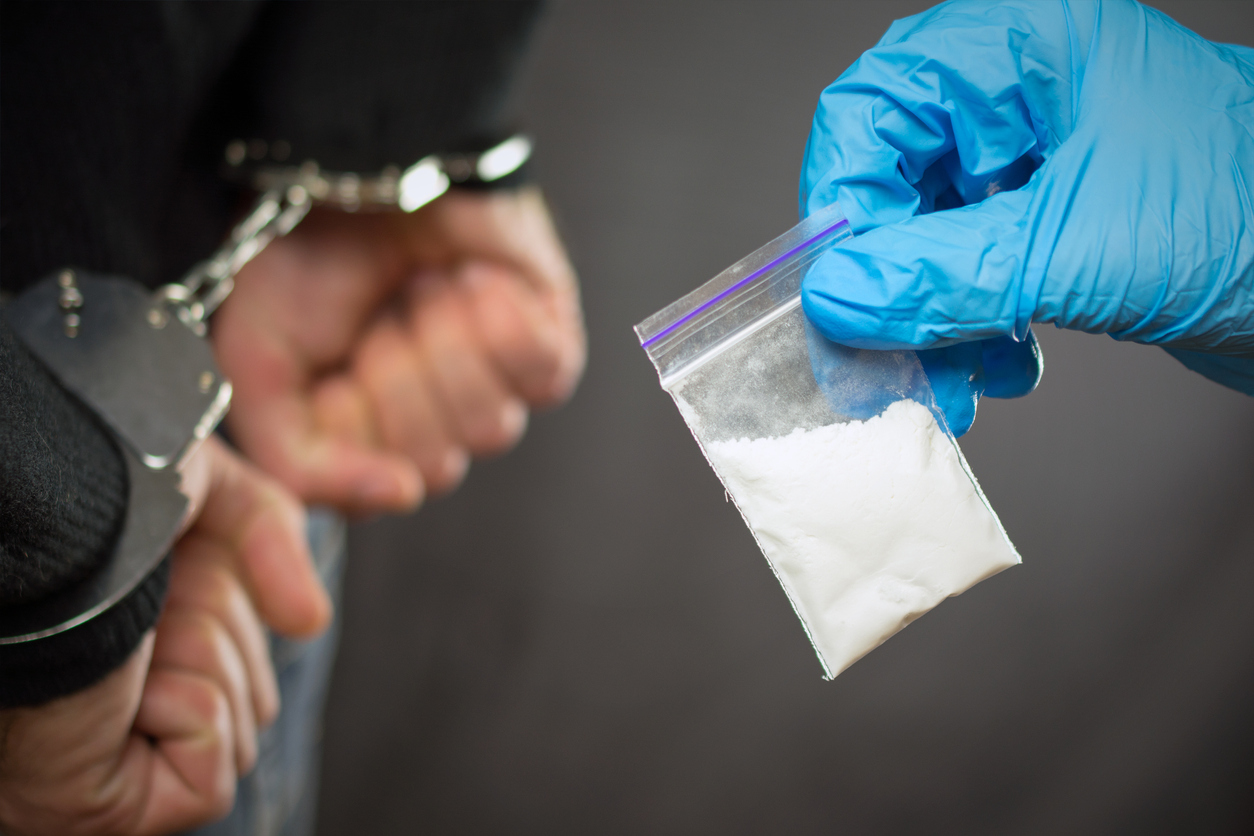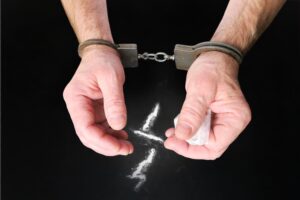Los Angeles Possession of a Controlled Substance

Law enforcement officers have arrested you for possession of a controlled substance in California. You’re wondering how serious this is, what the legal implications are, and how to protect your rights and freedom.
The short answer is that possession of a controlled substance is illegal in California under Health and Safety Code Section 11350. But the circumstances matter. The amount of drugs you possess, the type of drugs, your purpose for possessing the drugs, and prior convictions are just a few elements of this crime that will affect your penalty.
Don’t assume this is a misdemeanor you don’t need to take seriously. California aggressively prosecutes drug-related crimes, so you need a law firm that understands the intricacies of the state’s drug laws and how they apply to your case.
Having a Los Angeles possession of controlled substance attorney on your side with the experience to navigate this complex legal landscape is the only way to ensure the best defense. An attorney can’t promise a particular outcome, but they can minimize your chances of facing severe consequences.
Consequences of a Conviction for Drug Possession in California
If prosecutors convict you of possession of a controlled substance in California, the implications aren’t just short-term. They can haunt you for years by limiting your future career options.
A drug possession conviction on your record can make it difficult to:
- Get a job – Many employers do extensive background checks and avoid hiring anyone with a criminal record.
- Get a professional license – Professions such as health care, security, law enforcement, transportation, real estate, and the law, among many others, typically do background checks before allowing someone to obtain a license.
- Rent an apartment or house – Landlords routinely do background checks before they accept an application to rent their property.
It’s difficult to predict the consequences of a conviction for drug possession on your record. That’s why it’s important to get an attorney involved in your case as quickly as possible.
What Is a Controlled Substance Under California Law?

California law generally considers controlled substances to be either:
- Drugs that are always illegal, such as cocaine and heroin
- Certain prescription drugs that are illegal if you don’t have a prescription
The state’s Health and Safety Code also uses “schedules” to categorize controlled substances:
- Schedule I – Includes drugs such as cocaine and morphine
- Schedule II – Includes drugs such as opiates
- Schedule III – Includes drugs such as pentobarbital
- Schedule IV – Includes some prescription drugs
- Schedule V – Includes prescription drugs that are less controlled than others
Penalties are more substantial if you possess a Schedule I controlled substance than for possessing a Schedule V drug. But all can be serious. Even possessing prescription drugs that weren’t prescribed to you can lead to felony charges if the prosecution can establish that you intended to sell them.
An experienced attorney will help you understand which schedule applies to the drug you’re accused of possessing.
California Controlled-Substance Law: Simple Possession vs. Intent to Sell
A significant element of your case is whether prosecutors charge you with simple possession or possession with an intent to sell.
Here’s the difference, as HSC 11350 spells out:
- Simple possession makes it a misdemeanor to possess a controlled substance unlawfully. And this doesn’t just apply to street narcotics. Law enforcement can charge you with simple possession, also known as possession for personal use, if you have legal prescription drugs without a valid prescription.
- Possession with intent to sell is a felony that applies when the state believes that you intend to engage in drug dealing.
The legal differences between simple possession and possession with intent to sell are important, and a knowledgeable attorney will help you understand which applies to your case.
Prosecutors charging you with intent to sell must demonstrate that you intended to either sell the drugs or have someone else sell them. They don’t have to prove that you sold them yourself.
The prosecution must also demonstrate specific factors, including:
- Quantity of drugs – Large amounts of a controlled substance
- Packaging and paraphernalia – Materials such as baggies, scales, or other items associated with drug distribution or manufacturing
- Money and transactions – Having large amounts of cash or evidence of large financial transactions
- Weapons or firearms – Possession of weapons or firearms along with drugs, possibly implying an intent to protect drug-related activities
- Statements or admissions – Any statements or admissions you make to law enforcement or others
- Surveillance or observations – Undercover law enforcement operations, surveillance footage, or witness accounts
- Location and circumstances – Being near a school, park, or other sensitive area
If the prosecution alleges any of these elements, it may be preparing a felony charge of intent to sell. Get a lawyer experienced in laws governing possession of a controlled substance in California who knows how to counter the prosecution’s allegations effectively.
Penalties for Possession of a Controlled Substance
Californians passed Proposition 47 in 2014 primarily to refocus prison spending on violent and serious offenses. The proposition changed some controlled substance possession offenses from felonies to misdemeanors.
If you’re convicted of possession of a controlled substance, you face up to one year in county jail. As discussed below, you may be eligible for a drug diversion program instead of jail time.
If you’re convicted of drug possession with intent to sell, you can face two, three, or four years in prison and a fine of up to $20,000.
Penalties for either charge can depend on how skillfully your defense presents your case. Consult with an attorney with a strong track record in drug possession cases to manage your defense and get the lowest possible sentence.
California Drug Diversion Programs: An Alternative to Jail

If you’re convicted of possession of a controlled substance in California, you may qualify for a drug diversion program as an alternative to jail time.
To qualify, you must:
- Be a first-time offender without any other controlled substance offenses on your record
- Not have been charged with any violence related to your offense
- Have no revocations of parole or probation on your record
- Have no felony convictions within five years of your latest charged offense
This option involves a series of classes lasting 18 months that focuses on drug treatment. It requires that you plead guilty to your drug charges but delays sentencing until you’ve completed the program. An attorney will help you determine whether you can qualify for drug diversion and will know how to negotiate with prosecutors to win you that option.
How an Attorney Can Help Your Drug Possession Defense
Defense attorneys play a crucial role in ensuring the best outcome in your case of possession of a controlled substance. The right law firm will know drug possession law inside and out and have a track record to prove its success at minimizing client sentences.
Here are a few ways a skilled, reputable defense attorney can make a difference in your drug possession case.
- Legal proficiency: The right attorney will understand the complex California drug possession laws as they apply to your case. They will know every aspect of the legal procedures, statutes and case laws related to drug offenses.
- Legal advocacy: A skilled attorney will advocate for you by crafting a solid defense strategy. That includes analyzing evidence, interviewing witnesses, and pinpointing any legal issues.
- Search and seizure challenges: Evidence collected during law enforcement search and seizure operations can be crucial to your case. An attorney will scrutinize the legality of all search and seizure procedures to see if law enforcement officers violated your Fourth Amendment rights. Any violation would be grounds for suppressing the evidence obtained in the search.
- Determining controlled substance classification: An attorney will question whether the substance was a controlled substance, possibly by challenging chain of custody, lab results, or misidentification.
- Medical exceptions for valid prescriptions: If you have a valid prescription for a drug, you are exempt from charges of unlawful drug possession in California. An attorney will know whether an exemption applies in your case.
- Miranda rights violations: An attorney will question whether law enforcement followed Miranda rights procedures. If they find a violation, that can affect the admissibility of any statements you made.
- Negotiating reduced charges or plea bargains: Depending on the circumstances of the case, prosecutors are sometimes willing to avoid a trial. Your attorney will negotiate for reduced charges, diversion programs, or other sentencing options. Hiring a defense attorney who can negotiate effectively with prosecutors could be the difference between jail time and other more favorable outcomes.
- Challenging constructive possession: Prosecutors can charge constructive possession even if you weren’t in physical possession of the controlled substance. They would have to prove you knew of the drug’s presence on or around the property and the ability to maintain control over the illegal drugs. Multiple people can also constructively possess the same illegal drugs, such as when drugs exist in a house where multiple people live or if you had keys to someone else’s car that contained unlawful controlled substances. An attorney can dispute this by arguing that you lacked knowledge or control of the drugs.
With so many factors potentially in play, you need a knowledgeable and experienced law firm to defend your rights. Are you ready to consult with a Los Angeles law firm that will fight for you?
A Los Angeles Firm That Knows Possession of a Controlled Substance Law
Facing charges of possession of a controlled substance in California is a challenging, confusing, and frustrating experience. You’re unsure of how to proceed, you lack knowledge of the intricacies of the legal system, and you’re afraid of serving prison time. You know this will have consequences for your life, career, and future, and you need to minimize the damage.
You need a law firm that will work tirelessly to present a solid defense and protect your rights to the utmost degree. They’ll understand the law governing possession of a controlled substance, the court system, and every possible way to minimize your sentence. And they’ll have the compassion to realize the implications a conviction can have on your life.
If you’re looking for a Los Angeles law firm to handle your case of possession of a controlled substance, Rodriguez Law Group is your best bet.
Rodriguez Law Group is an experienced Los Angeles law firm that fights diligently to protect our clients’ rights and get them the best outcome for their cases. Ambrosio Rodriguez brings the perspective of a former prosecutor with over 18 years of experience in criminal law. He has a long track record of providing clients with the guidance, support, and representation they need to get through this difficult time.

The firm has an experienced team of drug defense attorneys who know how to manage every detail of your case and support you in every way possible. They are skilled at negotiating with prosecutors to win the most favorable outcome possible, and they will guide you through the legal course that fully protects your future.
Contact criminal defense lawyers at Rodriguez Law Group today at (213) 995-6767 for a free consultation.


